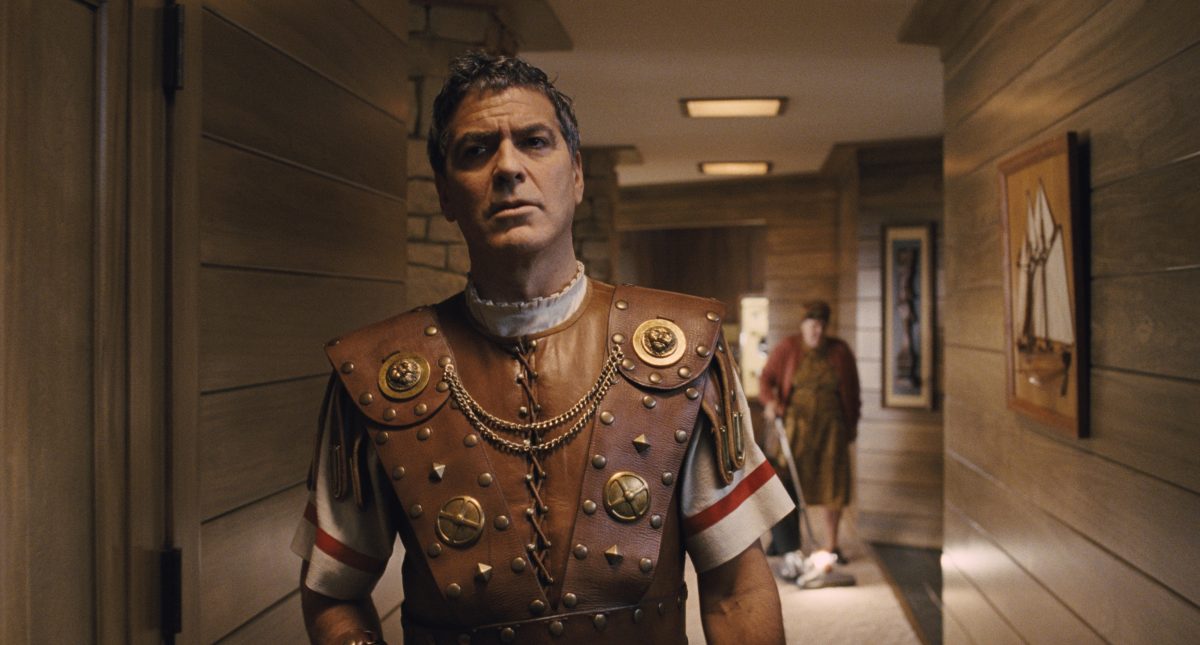
You rarely get exactly what you want but Joel and Ethan Coen’s Hail, Caesar! is, in fact, just what I wanted it to be: A playful, equal parts arch and affectionate look at a Hollywood studio in the 1950s, all wrapped around a (mercifully thin) plot involving the kidnapping of one of the studio’s biggest stars. Because, honestly, while the kidnapping plot is perfectly fine, the really delectable thing is watching the Coens hang around the studio lot, recreating poky Westerns and melodramatic parlor dramas and water ballets and sword and sandal extravaganzas, all while giving us a full-access pass to the real drama behind the scenes.
Our hero, if you will, is Capitol Pictures “fixer” Eddie Mannix (Josh Brolin), whose round-the-clock job is to insulate Capitol from scandal and preserve the carefully crafted images of its stars. Over the course of the film’s day, he has to put out one fire after the next, including an Esther Williams type starlet (Scarlett Johansson) who is having a hard time fitting into her mermaid suit (because she’s pregnant and—gasp!—unmarried); a disgruntled but unfailingly polite British director (Ralph Fiennes, hilarious), who has been saddled with a sweet, but dimwitted singing cowboy (brilliant and new-to-me Alden Ehrenreich) to play the lead in his sophisticated parlor piece; dueling gossip columnist sisters (both played by Tilda Swinton), who are looking for any whiff of scandal; a focus group of sparring clergy who have been brought in to give their blessings to the studio’s Jesus-themed Roman epic, Hail, Caesar!; and, of course, the biggest crisis of them all, the abduction of Hail, Caesar!’s blithely entitled leading man Baird Whitlock (George Clooney). Whitlock, as it turns out, has been kidnapped by a bunch of communist screenwriters, who are such an unintimidating, tweedy, and ineffectual crew that Baird feels more like an honored guest at a writer’s salon than a victim of an abduction.
While having his extremely busy and stressful day, Mannix is simultaneously fielding a cushy job offer from Lockheed Martin—it would mean more money and less work, but he’d also have to become part of the nation’s war industrial complex, right around the start of the Cold War. In some ways, Hail, Caesar! explores similar territory as last year’s Trumbo—the intersection between communism and Hollywood—but it does so in a more cracked, indirect, Coens-y sort of way. (Also, it’s way better.)
Not to discount some of the film’s more serious themes—the studio system as a microcosm of our capitalist economy; Mannix’s endless soul-searching (he spends several scenes in a confession booth)—but the greatest thing about Hail, Caesar! is that its loose structure allows the Coens to just mess around with the things they like. (I would say that the film is indulgent, but only if you understand that it’s indulgent in the best possible way.)
On the one hand, the Coens are gently mocking the corniness of this studio fare, but they recreate it with such gusto and delight it’s irresistible. The “aquamusical” scene—with its precision choreography and bird’s eye view—is so stunning it might singlehandedly revive the genre. The Roman epic, with its disgruntled extras wandering around in togas and overblown, pompous piety is note perfect. And I wanted the scene featuring Channing Tatum’s tap-dancing sailor in a bar—part of an exuberant Gene Kelly-style musical—to go on forever.
There are a few missteps—did we need two scenes where the Lockheed headhunter pursues Mannix? (And the less said about a scene involving a Russian submarine, the better.) But man oh man is Hail, Caesar! a treat. Turns out, it’s good to get exactly what you want.
